The 48 hours I spent in the hospital post-birth were a bit of a blur. Between doctors and nurses coming in and out, trying to figure out breastfeeding and the cycle of 20 minutes of dozing before I was interrupted by doctors or a hungry child, it wasn’t until I was back home and fumbling through the first few days and dozens of dirty diapers that the habits of Spanish parents – and just how different they were to my own upbringing – shook my baby-lagged brain.
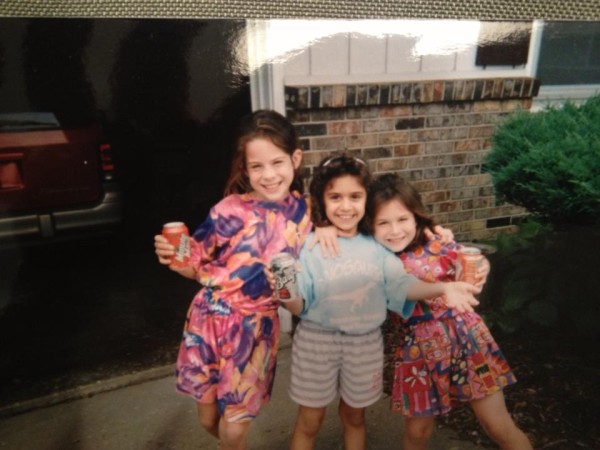
Fast fashion: my mom sewed all of my clothes growing up
I grew up without technology and in an American family in a large suburb of Chicago during the 1990s. Most of my childhood was shaped by the adults who had grown up in the 50s and 60s, and my mother stayed home with her two daughters until I, the elder, was seven years old. Summer camp, sports leagues and a part-time job in high school color my memories of growing up American, and they are also coloring the way I view child-rearing in Spain as I expect my second and push through the terrible twos of my somewhat terrible Spanish son.
The differences between parenting in Spain and parenting in the US are stark, and it begins with the fact that Spaniards tend to begin their families later. When I got married right as I turned 30, many of my friends back home were already parents or expecting; I was the first of my group of American girlfriends in Spain to have a baby, and many of my Spanish friends – including those older than me – have not made a foray into parenthood.
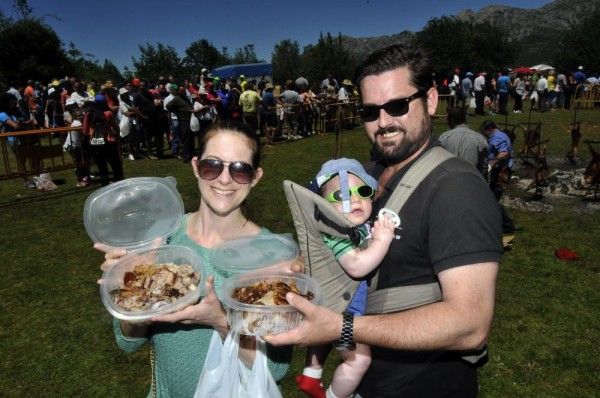
I’m a cool mom: taking my kid to a goat roasting festival in Quirós, Asturias
At home, I rule the roost and tread water between a full-time job, a toddler, a child on the way and a husband completing a master’s. It all feel imperfect yet under control, even if my American parenting ways sometimes clash with age-old Spanish upbringing habits – particularly with the older generation.
Ear piercing
When my husband and I found out we were expecting a boy, I breathed a sigh of relief: I would not have to make excuses for choosing to not pierce anyone’s ears. Most Spanish families pierce baby girls’s ears while they are a few weeks old or even at the hospital before being released. This is mostly due to the fact that the baby will not remember the pain, but it also aids in distinguishing boys from girls. I grew up playing sports and did not pierce my ears until my junior Prom, and at my mother’s insistence.
Even still, Enrique was a lovely baby who did not wear just baby blue, and many older women in the neighborhood mistook him for a lovely niña. I was always too tired to argue and just said a quick gracias to the nosy abuelas at the pharmacy.
Babies must be weighed at the same time every week
As Enrique grew, I became obsessed with knowing how much weight he had gained. It became a fun guessing game with my mother-in-law, who would take the bus to my home every Wednesday afternoon to weight him at the nearby pharmacy.
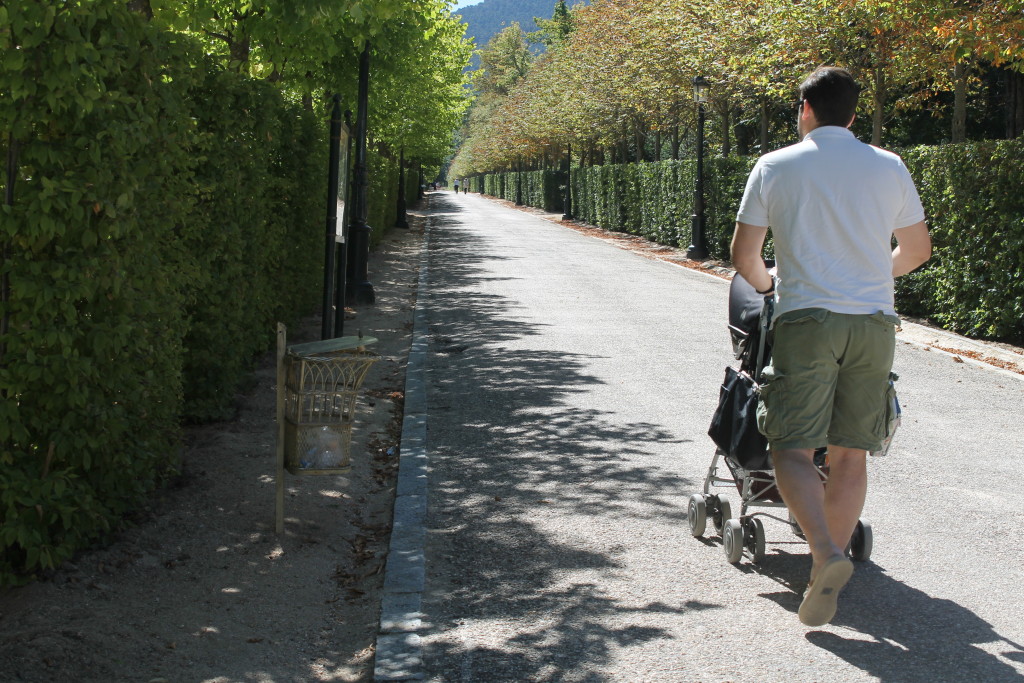
“Remember,” she said after a doctor’s appointment, “what he’s wearing and this time of the day, as you should always bring him into the pharmacy at the same time on the same day of the week and in the same clothing. That way, you get the most accurate reading.”
Imagine the horror when Enrique pooped shortly before the 5:30 pm weigh in one afternoon, or how much we laughed when he gained more than half a kilo in one week during a growth spurt.
Perfumes and perfect outfits
Babies are adorable and sleepy and smell good, they say.
They also spit up on themselves, poop constantly and get weird baby pimples as they fatten up. No matter – babies in Spain wear perfume and outfits that clasp, snap and buckle, both of which I find outrageous. I opted for buying newborn clothes that were soft, durable and well-priced. Enrique had a few beautiful pieces sewn and embroidered for him by family members, which I saved for special occasions and outings. Most of the time, he was in a zip-up pajamas in the cooler months and onesies that snapped at the crotch in the summer.
My mother-in-law dotes on my son and pleaded to buy a number of big-ticket items despite having a number of hand-me-downs. She was especially proud to buy him his first pair of shoes when he began to stand, but I was surprised when two came in the box. One pair were lovely brown boots to dress up a look, whereas the others were what we Midwestern Americans call gym shoes. “Well, because you don’t dress him like the other mothers. He’s ‘sporty.’”
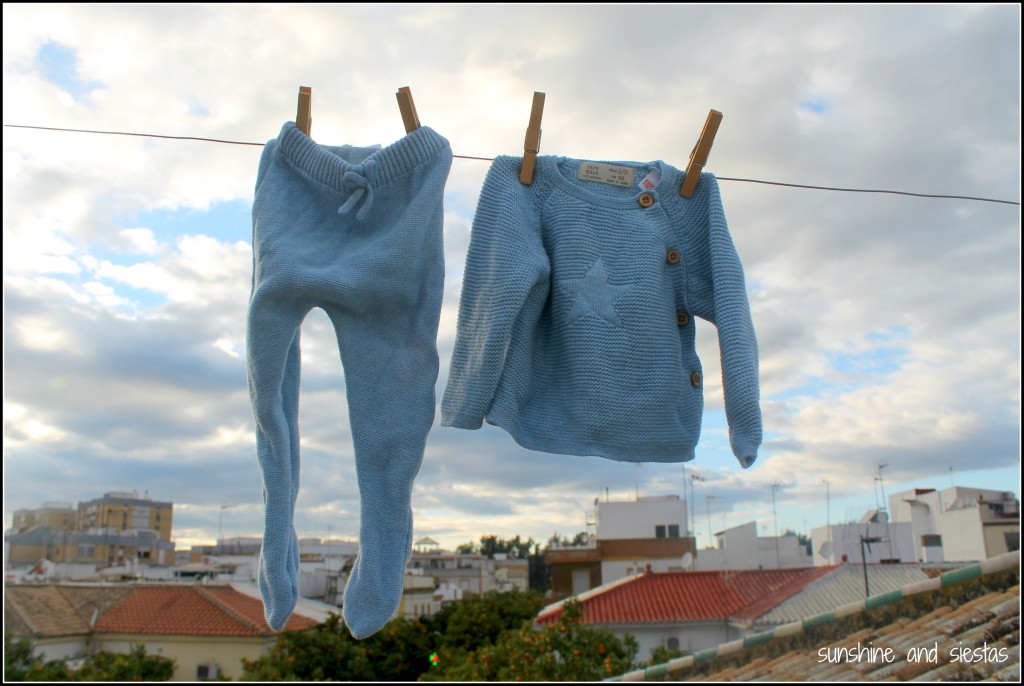
While there was absolutely no malice, she was right: I didn’t dress my child like the rest of the mothers (and I didn’t always dress myself up to leave the house, either – gasp!). I found the clasps and snaps a hinderance during a blowout caca, and considered his comfort over being adorable.
Thankfully, all of the baby perfumes were re-gifted as soon as we discovered Enrique is prone to dermatitis. A baby who pooped himself still smells like poop, even masked by a thick veil of Tous perfume for newborns (and who spends that much money on a baby perfume?!).
Breastfeeding, solid foods and when kids eat
I breastfed Enrique exclusively until he was four months old, something I felt pressured to do. It was time-consuming and he had reflux, but on the flip side I could do it anywhere (out to lunch! At the movies! On an airplane!) without scrambling to find a microwave or shelling out money for formula. We moved on to cereal at four months and were advised to start solids at six.
Enrique is a pretty good eater, but I was shocked when the pediatrician suggested his first lean meat come fro her barnyard friend, the horse, and that he should try kiwi at six – which landed him in the ER with a rash. In the US, we typically start on mushed veggies and certainly do not eat horse (my mother was silently weeping when I mentioned this to her).
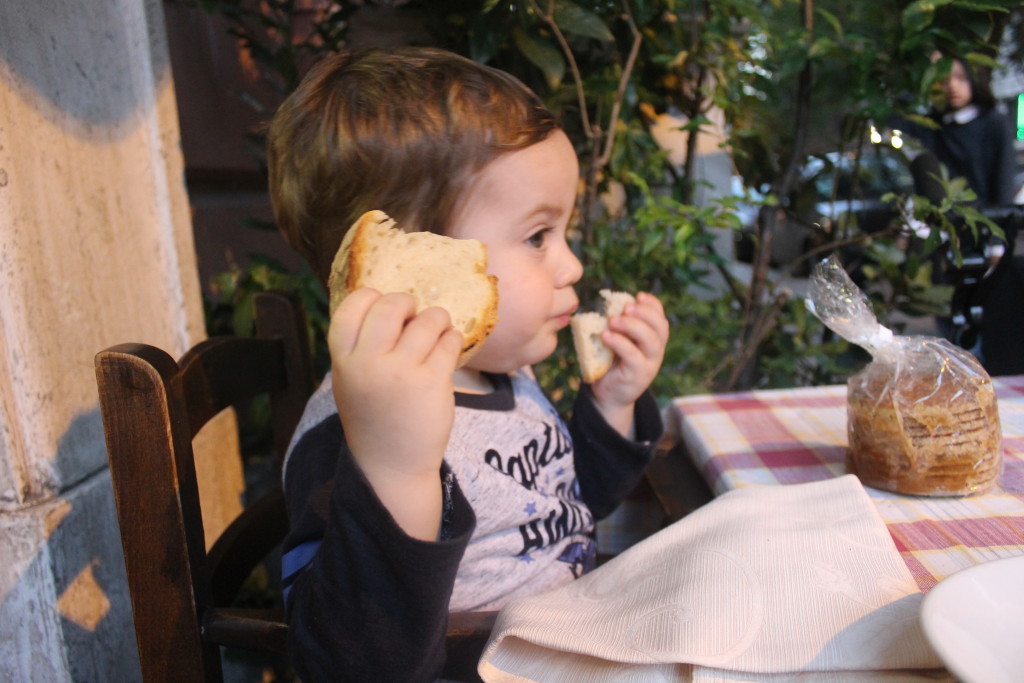
Don’t let this picture fool you – Enrique ate everything from charcuterie to tiramisu to caccio e pepe on our Rome trip
Kike’s favorite foods now are mostly kid friendly: fish sticks, yogurt and hot dogs. But he’ll also eat a full cocido marileño, is capable of eating an entire tapa of marinated olives and asks for bocadillos de foie for a snack. O sea, español when it comes to eating.
Bedtime and schedules
Spanish children go to bed extremely late. My friends – even the Americans – gasp when I tell them that my bedtime was 7:30 p.m. until I was 8, after which I could read until 8pm but that lights out was to be adhered to – no matter how late it got dark in the summer.
In casually mentioning that my kiddo is usually in bed by 9pm, I am met with bewildered looks. But when does he eat?! Around 7:30 or 8pm, right after his bath. Don’t you lay with him until he falls asleep? Nope, we have a bedtime routine after which I say, “Now Mommy is going to have dinner.” Enrique was not a good crib sleeper, but he leaves me to have some adult time in the evening.
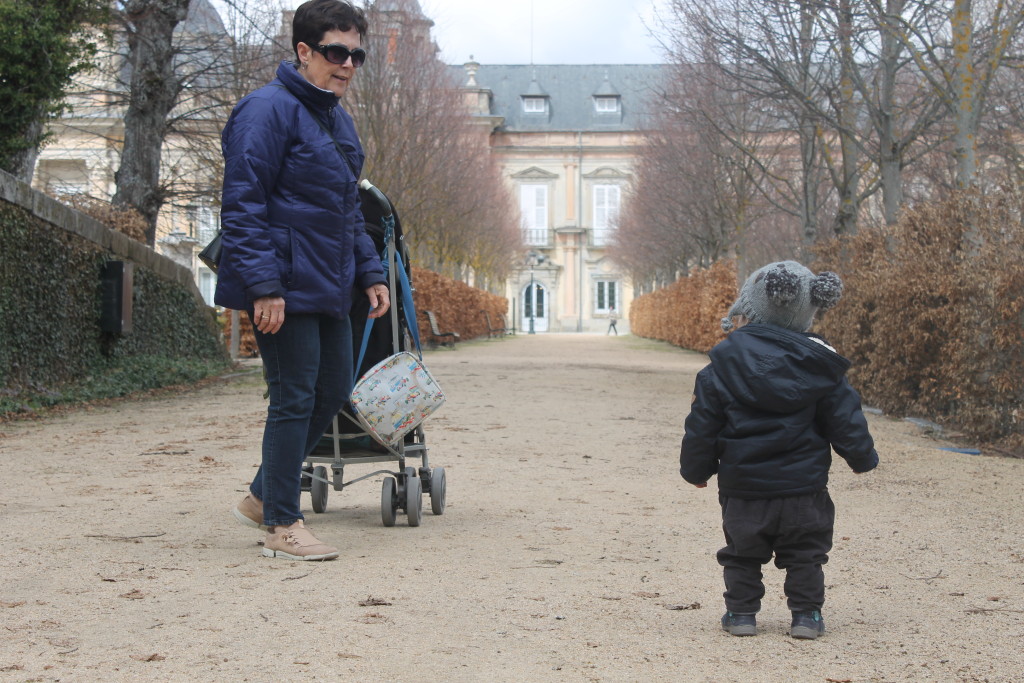
Likely talking grandma into not having a nap
My biggest thing is that my son’s designated nap time at daycare is right in the middle of the day, which is when we’d ideally like to be outside on cooler days or taking friends up on plans for meals. I am moderately strict on the weekends with both nap times and bedtimes, even when there are some tears (even from my friends when I tell them the time won’t work for me).
We also let him sleep late on the weekends. There is nothing better than me waking up on my own at 8am and having a cup of coffee and mindlessly scrolling through social media before I have to start the trudge through changing diapers and clothes and fighting against the TV. Speaking of…
Having the TV on all the time
This is as Spanish to me as a tortilla – Spanish households seem to have the TV on at every moment of the day, and my kiddo asks for Pocoyo as soon as he’s lucid in the morning. I try not to use no TV as a punishment and encourage him to play with his toys or color before he’s pushing the remote buttons and mine.
Family roles and relying on grandparents more
When I was a child, we lived five hours away from both sets of grandparents, so my earliest memories of being at home are with my mother. When she comes, 100% of her energy is focused on my son, and he knows Grandma speaks English, and Abuela speaks Spanish. I have only gotten a babysitter once, and that babysitter was a family member who traded a Saturday night out for Netflix and a pizza.
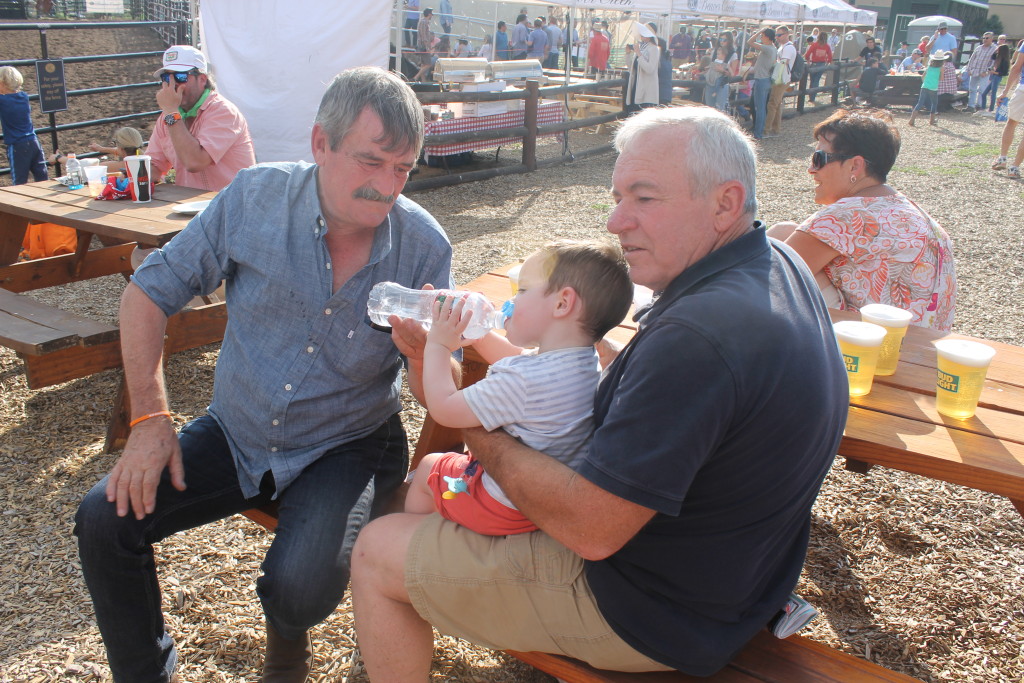
Dueling grandpas
Grandparents are very involved in Spain, particularly because both parents tend to work in major urban areas. It’s common to see grandparents pushing strollers, at the pediatrician and hanging out at the park. Some of my friends’ children do not even go to daycare but spend all day with their abuelos.
More than two years in and expecting my second, I feel like I have struck a balance. A Spanish friend of mine once said, you either raise a child “a la alemana,” or according to a strict schedule, or “a la gitana” or with the kiddo in charge.
Not a politically correct way to call it, but I am trying to raise Enrique and Millan “a la sevillamericana” – a hybrid of American and Spanish ideals and parenting habits. This all goes out the window when we’re in casa de los abuelos: his Spanish grandparents let him stay up until he is falling over, force feed him chocolate and homemade pudding and allow the TV to babysit. Still, I appreciate the closeness they’ve developed with Enrique and their desire to be involved or let this frazzled mom go have a haircut in relative peace.
Advice for being an expat parent abroad
Being a parent is a hard job, no matter how you slice it. It takes patience, humbling and some commiserating. Add to that cultural and often linguistic barriers, and you’ll find that the highs are extremely high, and the lows can feel crushing.
I often ask other expat parents in Spain for their advice and ideas for exploiting the fact that my children will grow up as not only bilingual but bicultural – and likely without noticing the difference between the two.
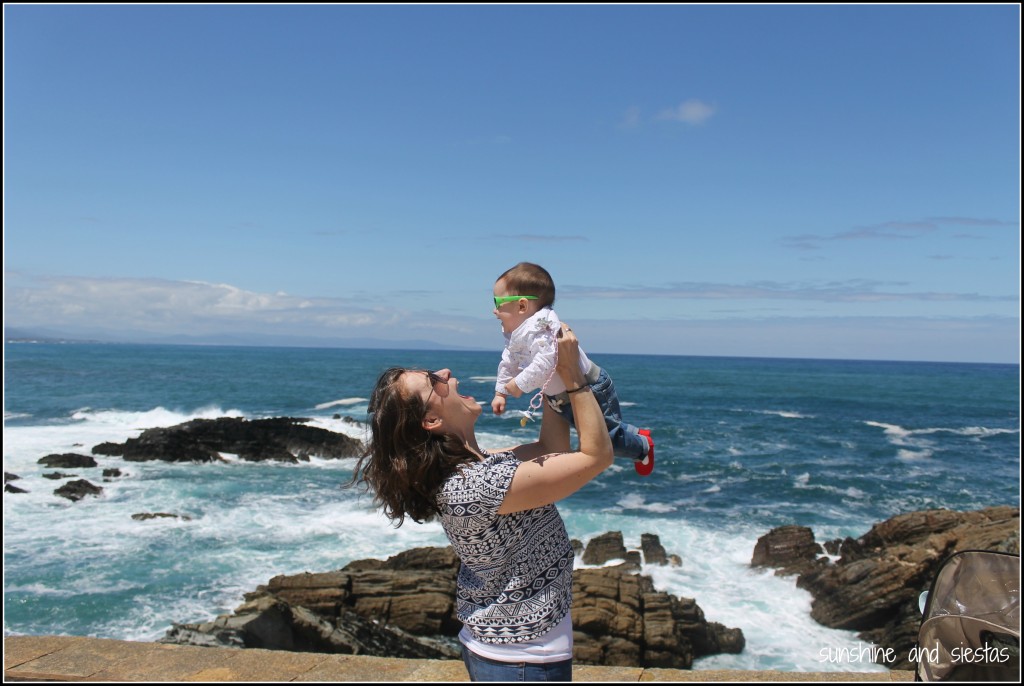
Perhaps the hardest part for me is doing so with my parents so far away, and knowing that their experience raising two kids in the 90s was way different than the issues and challenges I’ll face in the new millennium. It’s a frequent topic of discussion when we have our weekly chats: “You know, Catherine, things were just so different!”
Seek out other parents – both expats and locals – to help you navigate and lend a hand if you need childcare. A friend of mine came to visit Seville with her husband and two girls, and I loved watching them while my friends had dinner out for once. She’s been inspirational and helpful in seeing what’s coming and having the shared experience as an American mother raising children in Spain.
Remember that your child needs the fundamentals first – food, shelter and your love and attention. The rest will figure itself out. If you lead by example and encourage your child, he will learn (even if that means a watch down the toilet, having the kid with a dirty school uniform because you forgot to run a load of laundry or a house littered with toys and crumbs).

Don’t compare yourself to what everyone else is doing. There is no handbook to parenting, and especially a handbook to parenting abroad. They say in Spanish, cada niño es un mundo, and it’s true: each child is different, and so is every family. You will do the best you can if you believe in the work you’re doing. And you will mess up, so get over that fast.
I’m 30 weeks pregnant with another little boy (have you missed me on the blog?) and preparing for a second isn’t so much about researching car seats and ironing onesies – it’s about making peace with the fact that chaos is coming, that there will be four of us, that my body will turn back into a milking cow, a pillow and a punching bag. Now, who has advice for not losing my shit when I’m nursing one and scolding the other?
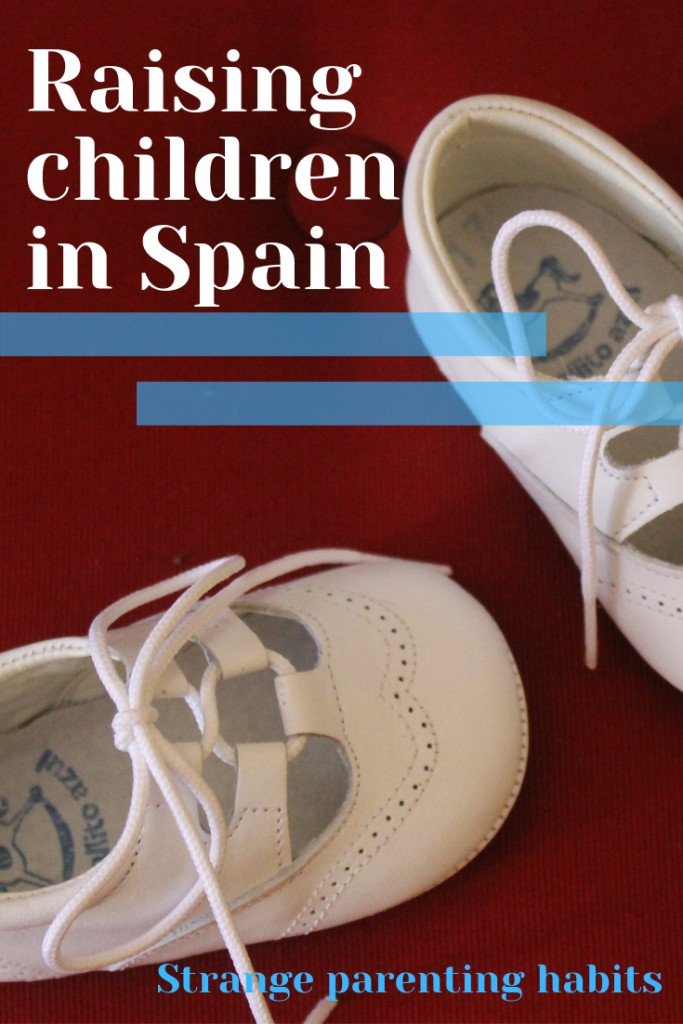
Have you noticed any other odd parenting habits in Spain or the country where you live?





Enjoyed this post, Cat!
I always notice babies and small kids out very late and always think how different it is from the States.
As for Spaniards having kids later, I hadn’t really considered that/noticed. I wonder if a lot has to do with the region their from in Spain. Growing up on the West Coast, it’s very typical that people have children later, like early thirties as they focus on university and their career first. Whereas I met an American woman from the Southern USA (my first year in Spain) and she was considered “different” by her family and friends for not having a child already by 24 years old, which surprised me. 24 seems young! She struggled with this because she wanted to have more experiences in life before “settling down and having a family.”
Hadn’t considered the TV always being on. My partner and I rarely watch TV but it’s true that at some family members house, immediately after lunch, the TV gets turned on. I always find it annoying.
I’ve been thinking about cultural differences a lot lately as I start considering a future family.
Hi Cat,
I re-discovered your blog recently. I am another American expat. I had begun following your blog about ten years ago when I moved there from France to be with my (now ex) novio. After a few years in Almeria, we broke up and I ended up moving back to France. I have since become naturalized and settled down with a French partner, and everything is great, but I miss Spain so much. Sometimes I regret leaving. I am vicariously continuing my Spanish life through your blog so thank you very much! Wishing you all the best for the rest of your pregnancy and soon having to juggle two kids!
Thank you, Kate! Sending my well wishes from Madrid!
Yep, based on my experience in both countries, I would have to say this is pretty accurate. I do love Nenuco cologne on babies, though!
Great post ..am agree with your these words ” each child is different, and so is every family. You will do the best you can if you believe in the work you’re doing”….. Thank for sharing your experience with us.
Harvindar K Grewal recently posted..Why are diapers necessary ?
Thank you so much for writing this! I’m an American mom in Spain, too, with a 2 year old boy.
Bookmarking this…
Thanks so much for sharing. Great post and learned a lot. What about schools in Spain?
It is very fascinating to see that grandparents raise their grandchildren and that there’s a very good bond between the families
https://tinytwigorganic.com/
Hi, I ran into this article while working! I loved it! Thank you so much for sharing! I am an expat too, well, half expat because I am half American half Spanish, and love doing things in an American-Spanish/Spanish-American way – always trusting my intuition on which works out best. Best wishes,
Gywn